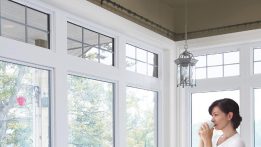 Technology is the way of the future, and the home has remained largely untouched by it for a number of years. Sure, the average home contains a multitude of TVs and computers as well as automated systems such as A/C and security, but recent years have brought a level of technology to the home that will revolutionize the way you live your life. Turning your home into a smart house may seem like an expensive undertaking, but the benefits of integrating technology into your everyday life can save you time and money in the long run. Here are some reasons to turn your house into a smart house:
Technology is the way of the future, and the home has remained largely untouched by it for a number of years. Sure, the average home contains a multitude of TVs and computers as well as automated systems such as A/C and security, but recent years have brought a level of technology to the home that will revolutionize the way you live your life. Turning your home into a smart house may seem like an expensive undertaking, but the benefits of integrating technology into your everyday life can save you time and money in the long run. Here are some reasons to turn your house into a smart house:
Efficiency
There is no denying that converting your space to make it “smart” requires some initial investment. The great thing about smart home devices is that they work towards recuperating this investment and saving you money in the end. Some of the most popular home automation devices are geared towards reducing the homeowner’s monthly utility bill. Imagine a scenario in which you leave for work one morning and on your way to your office you realize you left all the lights on in the kitchen. How easy would it be if you could just open an app on your phone and remotely turn off all the lights that you had mistakenly left on? With the emergence of sophisticated smart home technology, this is very much a reality.
Not only can you save money with your light fixtures, but you can also set up smart thermostats in your house that can be controlled through your mobile device. This allows you to change the temperature in your house from the comfort of your own bed or from miles away if need be. Another particularly inventive solution is the use of smart showers. Homeowners with hefty water bills may benefit from shower heads that can record how much water is used during a shower. These shower heads alert you once your allotted amount has been reached in order to indicate an ideal time to end the shower.
Peace of Mind
 Some of the first home automation features came in the form of security devices. Alarm systems that detect movement or send live streams to your phone via security cameras have become more popular as of late. Smart locks are a new form of technology that may arguably be the most important aspect of your smart home. Not only do smart locks allow you to open your door using an app on your phone, eliminating the need to be carrying around countless keys, but they also allow you to keep track of who is coming in and out of your house. With smart locks, you can create schedules to allow temporary access to other users such as other family members, friends, or even maintenance personnel. These devices guarantee that you will never have to second guess whether you have secured all the entrances to your home.
Some of the first home automation features came in the form of security devices. Alarm systems that detect movement or send live streams to your phone via security cameras have become more popular as of late. Smart locks are a new form of technology that may arguably be the most important aspect of your smart home. Not only do smart locks allow you to open your door using an app on your phone, eliminating the need to be carrying around countless keys, but they also allow you to keep track of who is coming in and out of your house. With smart locks, you can create schedules to allow temporary access to other users such as other family members, friends, or even maintenance personnel. These devices guarantee that you will never have to second guess whether you have secured all the entrances to your home.
Security systems are not the only way to guarantee peace of mind. There are countless other hazards that the average homeowner worries about that can be reduced through the use of technology. Automated outlets provide homeowners with a sense of comfort by allowing them to switch the power to devices on and off through an app. Smoke detectors are also becoming automated and provide consumers with an advanced system that can better differentiate between false alarms and actual hazards. If you are not home during an emergency, these devices will send you an alert through your phone, call 911 on your behalf, and may even call your landline in order to guide children or elderly family members out of a dangerous situation. Protecting your space has never been easier.
Ease of Use
Home automation can be intimidating at the beginning and can come across as quite confusing, but it doesn’t have to be. One necessary device to turn your smart home into a single cohesive unit is the use of some sort of hub. These hubs, produced by Google, Amazon, Logitech, and countless others, allow you to integrate multiple smart devices for easier accessibility. From this hub, you can give commands that control the lights, thermostat, locks, and even garage door. Depending on the hub, you can also use it to play music, order pizza, or even check your bank account balance. Some hubs then combine all these features into an app which allows smartphones to act as universal remotes for the home.
Buying new gadgets is fun and exciting, but the ideal smart home is one in which the devices communicate and work together to create the ultimate experience. Most of the latest hubs out on the market employ the use of a technology known as “IFTTT,” which stands for “If This Then That.” This service allows users to create commands so that a simple phrase can trigger a reaction of events. Instead of having to individually turn off all the lights, close the blinds, turn off the TV, and lock the doors, IFTTT commands allow you to repeat a phrase to your hub which will do all of the aforementioned tasks for you. Syncing up your devices to a hub means that they are working more efficiently in order to complete more complex tasks.
Innovation
Some may view home automation as an unnecessary luxury, but in actuality, it is a channel of innovation that has remained largely untapped and will begin to grow in the coming years. While a large portion of your home may retain its traditional qualities, purchasing a few smart devices here and there will allow for an easier transition as technology advances. Appliances have a life expectancy, and smart devices will be the only kind on the market one day. Taking small steps to automate your home allows you to slowly customize your space and build up a system that fits your lifestyle and needs. Smart home devices are not for everyone, but they are more than attainable for those with an interest. ![]()
Katerin Rodriguez
Home & Yard Magazine




